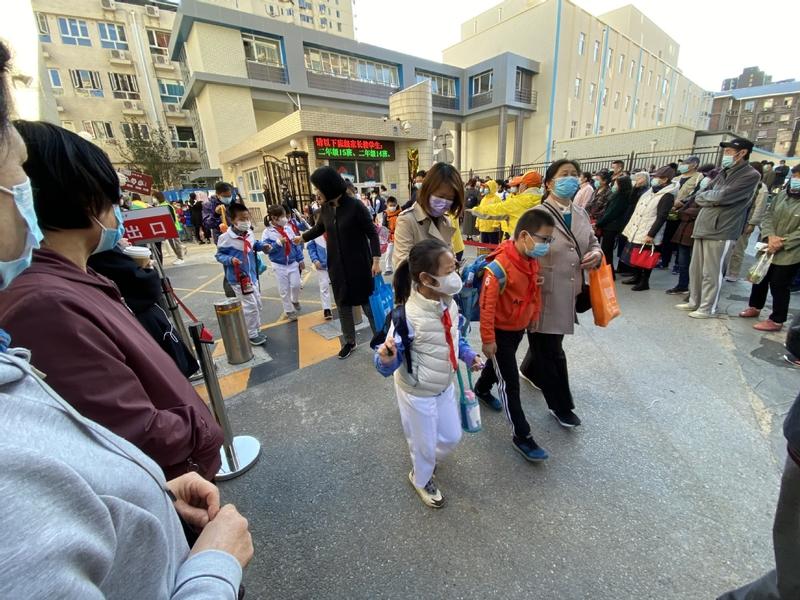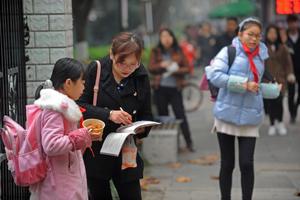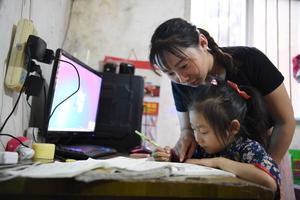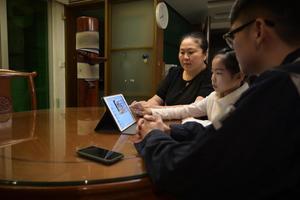Heated debate triggered by WeChat groups
 Parents and grandparents wait for children after classes at a primary school in Beijing. (DU LIANYI / CHINA DAILY)
Parents and grandparents wait for children after classes at a primary school in Beijing. (DU LIANYI / CHINA DAILY)
Fraught parent-teacher relationships are nothing new in China, but social media has given them a new dimension.
Heated discussion has been prompted by WeChat teacher-parent groups, resulting in a high degree of emotion on both sides
For example, when a teacher asked a 34-year-old father at a school parents' meeting why he constantly failed to reply to WeChat group messages, and also about the way in which he cared for his son, the father burst into tears.
... but I don’t know when it (the group’s aim) changed to become a ‘free-for-all’, with parents arguing, showing off and attempting to curry favor with teachers
Han Fang, mother of a primary school student in Beijing
According to media reports, the father, surnamed Yu, whose wife died many years ago, said he had too much work to do to support two elderly family members and his son. As a result, he was unable to follow the hundreds of messages in the chat group.
In Jiangsu province, another young father posted a short video, in which he asked, "What's wrong with me quitting the WeChat group?"
The footage went viral, with many netizens supporting the father's decision, but saying they dare not follow suit, as they feared their children would be treated differently at school.
In the video, the father said one teacher always told parents to correct their children's homework, which he believed was the teacher's job.
These fathers are just two of the millions of parents who have complained about WeChat teacher-parent groups being used as a new mode of communication between schools and families.
In addition to grievances over parents being asked to help correct their children's homework, many other protests have been made against the groups.
Han Fang, the mother of a primary school student in Beijing, said, "There are too many messages and the phone keeps beeping while I'm at work.
"I dare not block group messages in case I miss important news, but there are always many useless group texts and you never know whether you should check these messages or not."
Unlike other apps, WeChat's audio messaging and video chat functions enable parents and teachers to talk to each other whenever and wherever they want.
However, such convenience has become a source of stress for teachers and parents.
Teachers feel pressured to respond to parents at any time of day, while parents worry about how they should react in such groups.
Han said: "I understand that the groups can help with direct, swift and informative communication between teachers and parents, which was the original aim, but I don't know when it changed to become a 'free-for-all', with parents arguing, showing off and attempting to curry favor with teachers."
 A mother drives her son to school in Ji'nan, Shandong province. (WANG JIAN / FOR CHINA DAILY)
A mother drives her son to school in Ji'nan, Shandong province. (WANG JIAN / FOR CHINA DAILY)
Compliments sent
According to some netizens, there is a tendency for parents seeking preferential treatment for their children to use the groups to excessively compliment or show their gratitude to teachers.
Parents even said they go to clean classrooms or to school canteens to help with meals. Some of them are encouraged by teachers, while others do so voluntarily.
Lin Ling, whose daughter is a student in the third grade at a Beijing primary school, said she is not worried about WeChat group messages.
"The teachers send messages and news about the children, which we need to know and which is completely reasonable," she said.
"However, I dislike it when a teacher sends posts to compliment those parents who buy items for the class, which to me, seems to be a hint that others should do the same."
According to Lin, some parents voluntarily buy books and other material for school events.
"I understand that these parents can possibly gain favor from teachers and that their children might be better treated at school, but I don't think it's good to post this in a WeChat group and encourage it," she said.
"It makes me feel pressured and it seems that if I don't do something similar, my child might possibly be ignored at school."
Mao Dachuan, the father of a fourth grade primary school student in Beijing, said parents in his group always send greetings to students celebrating a birthday, which he thinks is unnecessary.
"It's also an unwritten rule among teachers that the parents of a child celebrating a birthday should buy every student in the class a book as a gift," he said.
"Is this reasonable? A child with a birthday is not encouraged to receive presents at school, but his or her parents are expected to spend more than 1,000 yuan (US$151) buying books for some 40 kids they don't even know."
 A mother in Wuhan, Hubei province, checks her daughter's homework before class starts in the morning. (CHENG YING / FOR CHINA DAILY)
A mother in Wuhan, Hubei province, checks her daughter's homework before class starts in the morning. (CHENG YING / FOR CHINA DAILY)
Mao has few complaints about messages in the group, as he seldom pays attention to them.
"I blocked the group and only give it a glance once or twice a day when I have time or when I go to pick up my son," he said. "I am not bothered by it that much and I don't think I'll experience a breakdown just because of an online group. As parents, we face much more pressure than that."
Zhao Xing, the mother of two children in Beijing, said she is in several WeChat teacher-parent groups and some groups solely with other parents. She feels good about both types.
"My daughter is in primary school and my son at kindergarten. If you expect your children to perform well at school, you must pay attention to teachers' arrangements for parents, no matter how hard your own work is. Otherwise, the buck passes back to the teachers," she said.
Zhao believes that spending time in such groups is all part of being a responsible parent.
"Times are changing and we have to embrace this change. We cannot just constantly sit back and say that our own generation grew up perfectly well at a time when there was no WeChat," she said. "Yes, there was no internet once, but it has since brought so many benefits to the world.
"The key is to establish standards and regulations, use them in a better way and avoid any negative impacts. I don't think any problems are solved just by quitting the group."
 A girl in Lu'an, Anhui province, receives help with her homework from her mother. (WU WENBING / FOR CHINA DAILY)
A girl in Lu'an, Anhui province, receives help with her homework from her mother. (WU WENBING / FOR CHINA DAILY)
Regulations issued
As problems continued to surface, many local education departments issued regulations to better control WeChat teacher-parent groups.
In Shanghai, the education bureau in Jing'an district published a guideline titled "Pact for the Creation of Middle and Elementary School Class WeChat Groups," in effect banning all posts not related to students and schools, including advertising and digital red envelopes.
It also prohibited criticism of individual students by name and disclosure of student grades and class rankings. In April, another district in the city, Pudong New Area, issued similar guidelines.
In Taiyuan, capital of Shanxi province, the education bureau made it clear that teachers should not ask parents to correct homework, clean classrooms or repost certain messages to WeChat groups.
In areas where the authorities have not introduced such policies, some schools have brought in their own regulations.
A kindergarten in Dalian city, Liaoning province, introduced nine standards for WeChat teacher-parent groups. In particular, the school said parents should not send flattering messages in the groups to gain favor from teachers.
In Beijing, high schools in Fengtai district have banned teachers from posting students' grades or rankings in the groups.
Some teachers said they feel exhausted by group chats, especially when parents send messages to them at all hours.
In the groups, many teachers state that parents only need to read notices and announcements. They should not reply to them.
Liu Hailian, a psychology teacher at Fengtai No 2 High School, said the aim of a WeChat teacher-parent group is to help students better themselves and become healthier.
"We also have meetings with parents and communicate regularly with them by phone," she said. "Education is a huge and crucial issue for both sides and we should work together and cooperate closely to make improvements."
Liu's school helps parents to better communicate with teenagers.
"Parents need to learn about education and they also want to know that a school is providing high-quality lessons," she said.
In the 1990s, before the computer and internet era, many parents attempted to please teachers by sending them gifts or doing tasks for them.
However, in 2014, the Ministry of Education banned such gifts.
The country still faces many challenges in the education sector, including an imbalance in resources available for kindergartens and primary schools.
In high schools, the national college entrance exam, or gaokao, which has a huge bearing on students' futures, is highly competitive.
These factors have created a significant amount of parental anxiety.
 A family in Guangzhou, Guangdong province, watches a livestream broadcast of a school meeting with parents. (JI DONG / CHINA NEWS SERVICE)
A family in Guangzhou, Guangdong province, watches a livestream broadcast of a school meeting with parents. (JI DONG / CHINA NEWS SERVICE)
Too serious
Lin Lei, 35, whose daughter has received kindergarten and primary school education in China and the United States, said he feels that Chinese parents take life too seriously.
"After we returned to Beijing from the US when I decided to start my business in China, my wife spent much more time on our daughter's school studies," he said.
"I think it's a systematic problem and that many parties, including teachers, parents, schools and education authorities, need to make some changes.
"There are no WeChat teacher-parent groups in the US. I believe the growing popularity of new communication tools such as these groups has reshaped the way parents and teachers interact and has exacerbated their feelings of anxiety.
"Teachers are already overworked and don't want to spend their free time being pestered by parents. Everyone feels exhausted, and no one has actually achieved anything."
Xiong Bingqi, deputy head of the 21st Century Education Research Institute in Beijing, said there should be a boundary line between schooling and parenting.
China should also accelerate education assessment reform and school management to bring parent-teacher relations "back to normal", he said.


